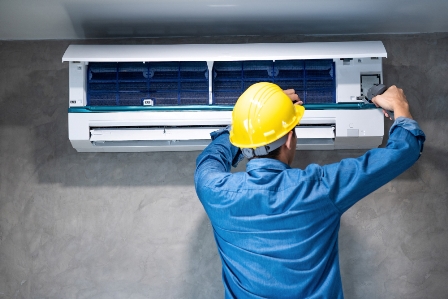Imagine walking into a department store that has been around for more than a century. Sounds prestigious, right? Sears, an American institution since 1892, has been that go-to place for everything from tools to clothing. But did you know they also excel in heating and air conditioning systems?
1. Importance of Heating and Air Conditioning
The importance of a reliable heating and air conditioning system can’t be overstated, especially when dealing with extreme weather conditions. So why not opt for a name you can trust?
2. Why Choose Sears?
2.1 Brand Reputation
We can’t stress enough the importance of going with a brand you can trust. Sears has been in the game for a long time, earning a reputation for quality and reliability.
2.2 Expertise
When it comes to expertise, Sears checks all the boxes. Their technicians are highly skilled and certified, ensuring you’re not playing Russian roulette with your HVAC system.
2.3 Product Range
Diversity is the spice of life! With Sears, you have a plethora of heating and air conditioning systems to choose from, each designed to meet specific needs.
3. Types of Heating and Air Conditioning Systems Sears Offers
3.1 Central Air Conditioners
These are the big guns, perfect for larger homes and offices. Sears offers a range of these powerhouses, ensuring your entire space is uniformly chilled or heated.
3.2 Furnaces
If you’re living in colder regions, a furnace from Sears could be your best friend during those chilling winter nights.
3.3 Heat Pumps
Ideal for moderate climates, heat pumps can both heat and cool your space efficiently.
3.4 Ductless Mini-Splits
For smaller spaces or homes without ductwork, Sears offers ductless mini-splits that are both energy-efficient and space-saving.
4. Energy-Efficiency and Sears
4.1 ENERGY STAR Products
Want to save on energy bills? Sears offers a selection of ENERGY STAR certified products that promise better efficiency without compromising on performance.
4.2 Importance of Energy-Efficiency
Energy-efficient appliances are not just pocket-friendly; they’re also earth-friendly. Choosing an efficient system minimizes your carbon footprint.
5. Pricing and Financing
5.1 Cost Factors
While quality comes at a price, Sears offers a range of systems to fit different budgets.
5.2 Financing Options
Worried about shelling out a large sum upfront? Sears provides flexible financing options to ease the burden.
6. Installation Process
6.1 Consultation
Before any installation, Sears provides a comprehensive consultation to evaluate your specific needs.
6.2 Installation
Quality installation by certified technicians ensures your system performs optimally.
6.3 Post-Installation Service
You’re not left in the dark post-installation. Sears offers excellent post-installation services and guidance.
7. Warranties and Guarantees
7.1 Types of Warranties
Sears provides different types of warranties to give you peace of mind.
7.2 Extended Protection Plans
To safeguard your investment, extended protection plans are also available.
8. Customer Service
8.1 Accessibility
Customer service at Sears is easily accessible, ensuring that you always have someone to turn to for your heating and cooling needs.
8.2 Support and Maintenance

Regular maintenance is key, and Sears offers a variety of plans to keep your system running smoothly.
9. Comparison with Other Brands
9.1 Sears vs. Carrier
While Carrier specializes in air conditioning, Sears offers a more diverse product range.
9.2 Sears vs. Trane
Trane is known for its durability, but Sears scores higher in terms of customer service and financing options.
FAQs Answers
In the context of Heating, Ventilation, and Air Conditioning (HVAC), Sears refers to the brand of HVAC systems and services provided by Sears Home Services, a division of the well-known retail company Sears. Known for quality and reliability, Sears offers a wide variety of HVAC products, including central air conditioners, furnaces, heat pumps, and ductless mini-splits, along with installation and maintenance services.
Sears furnaces are manufactured by a variety of companies but are sold under the Sears name as part of their Home Services offerings. Each furnace is built to meet Sears’ standards of quality, efficiency, and durability. The specific manufacturer may vary, so it’s advisable to consult the product manual or speak to a Sears representative for details.
The cost of a heat air conditioner (often referred to as a heat pump) can vary widely based on several factors including the model, its features, and the size of the space it is intended for. Prices can range from a few hundred dollars for small, portable units to several thousand dollars for more advanced, energy-efficient models designed for larger spaces. Installation costs are usually additional.
The cost-efficiency between an air conditioner (AC) and a heating system can depend on various factors including the climate where you live, the efficiency of the unit, and current energy prices. In general, heating systems like furnaces often use more energy, especially in extremely cold climates. However, high-efficiency heat pumps can provide both heating and cooling at a cost comparable to, or even cheaper than, traditional AC units.
The “better” option between an AC and a room heater depends on your specific needs. If you live in a hot climate, an air conditioner would be a necessity. Conversely, a room heater is essential for cold climates. Heat pumps offer the flexibility of providing both heating and cooling and can be a cost-effective and space-saving solution.
The amount of electricity used by an AC or a heater depends on the efficiency of the unit, how long it runs, and the size of the space. Generally speaking, electric heaters often use more electricity than air conditioners because generating heat is typically more energy-intensive than removing heat (cooling). However, high-efficiency models of either can be more cost-effective in terms of energy use.
Conclusion
When it comes to heating and air conditioning systems, Sears offers a well-rounded package: quality, expertise, and excellent customer service. Next time you’re in the market for a new HVAC system, remember to consider Sears as a viable option.

